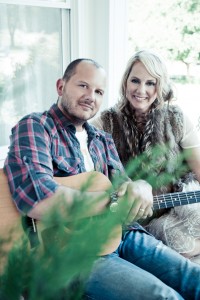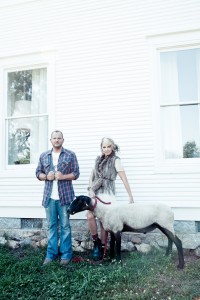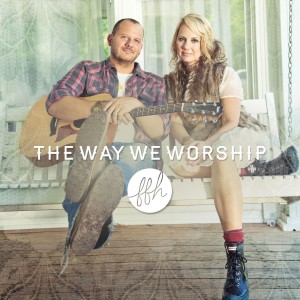 When it comes to longevity within the music business, 20 years is almost a lifetime. And in the past 20 years, husband and wife duo Jeromy and Jennifer Diebler of FFH have certainly experienced a whole lot of life—from the mountaintops where gold records can be found to the valleys where natural disasters and disease can rock your world.
When it comes to longevity within the music business, 20 years is almost a lifetime. And in the past 20 years, husband and wife duo Jeromy and Jennifer Diebler of FFH have certainly experienced a whole lot of life—from the mountaintops where gold records can be found to the valleys where natural disasters and disease can rock your world.
Much of that experience has been amplified by the Diebler’s six-month trip to South Africa followed by Jeromy’s diagnosis of multiple sclerosis in the fall of 2007. Then came the devastating Nashville flood in 2010 that destroyed the family’s home. As Jeromy says, “this has been a really interesting season.”
Most recently, FFH has released a hybrid worship/lullaby/hymns project called The Way We Worship but things will likely never be the same for this heralded Christian duo. And Jeromy is okay with that. In this Whole Notes interview, he explains how Africa changed his family’s life, how the latest album came to be and the lessons they’ve learned along the way:
Chad Bonham: Tell me about the six months your family spent in Africa.
Jeromy Diebler: We knew we wanted to take a break from music. We didn’t know how long it was going to be. A lot of it was about our marriage. Jennifer and I had been touring together for 10 years and we had innocently morphed into Jennifer and Jeromy of FFH and it was less about Jennifer and Jeromy the married couple. We needed to be away for a while. So we went to Africa. That helped us a lot. Life in Africa is hard. It wasn’t for us. We were living in a little farm community spending U.S. dollars, so with the exchange rate, we were fine. But we got to see how life is hard in Africa. To contrast that, we saw how hard life can be, but we also learned that hard is not positive or negative. Hard doesn’t have good or bad. Hard is just hard. A lot of times hard can be good and sometimes hard can be better than easy. When we came home, one of the biggest realizations was how relational things are in Africa and how we got used to that and how much harder relationships are here.
Bonham: How did the initial discovery that you had MS impact your personal life and your desire to keep your music career going?
 Diebler: When we got back, we had 70 show offers and we said no to them all. We had to wait and see what was going to happen with me. Then Jennifer lost her grandparents and our daughter Sadie was born and so much life happened during that time. We couldn’t just continue on like we were before. So we had to reset everything. And then our house was flooded and we had to start over again. This has been a really interesting season.
Diebler: When we got back, we had 70 show offers and we said no to them all. We had to wait and see what was going to happen with me. Then Jennifer lost her grandparents and our daughter Sadie was born and so much life happened during that time. We couldn’t just continue on like we were before. So we had to reset everything. And then our house was flooded and we had to start over again. This has been a really interesting season.
Bonham: What has been the lesson from these challenging situations in your family’s life?
Diebler: It goes back to our experience in Africa, but God has had gifts for us inside the suffering. We’ve had to be still long enough to see it and find it, but it’s been good. It’s been a good time. It’s not been a party. We’re living in our fifth rental house in two years. It’s half the size of the house we lost in the flood. We lost everything that we owned. I think I have my Bible and we have some birth certificates and some tax records. But we’re happier and we have more peace and we have more contentment. We’ve gone through a lot of hard things and at times it still is, but we are happier. How do you explain that? I think the only way you can explain that is Jesus.
Bonham: How do you explain the fact that you and your wife have such compatible voices, almost like something you’d expect from siblings that sing together?
Diebler: That’s something that has to come from God. We sound alike. This is what God did. I had no hand in that. Even when I was younger, 16 or 17 years old, I always thought it would be really cool to be in a band with my wife. So God put that in me a long time ago. Our strongest suit is singing harmony together.
Bonham: How did you choose the unique mix of hymns, worship songs and original music for the latest album?
 Diebler: The most interesting part of this process is that we didn’t intend to make this record. Making a worship album was not on our radar. We had made the record Wide Open Spaces when we got back from Africa. That was two years in the making. So then we decided to make a Christmas album and that went great. We got that out of the way and went back into the studio to do another FFH album. So were in this meeting with Provident and the president of the label and the president of marketing and two or three other people. Then there was another guy in the room. He was the youngest guy and definitely the hippest guy. He’s got his hat pulled down and he’s not really paying attention. We went back and forth about the next FFH record and I was telling them about how I was excited to get back in the studio and write new songs. So before we got up to leave, I said, ‘Oh by the way, Jennifer and our guitar player John have been working on a record together. Jennifer sings our kids to sleep every night and she usually sings old hymns. She wants to make a record just for our kids and our family. We might sell it at shows. If you have any interest in packaging that with this record or if you want to hear it, let me know.’ And that dude with the tattoos looks up and goes, ‘Now that I would buy.’ I had explained that it would be really mellow and soft and nice. So we started this new discussion and the president of the company agreed that it was a good idea. They decided they would rather have a bluegrass lullaby record instead of a typical FFH record because it was something they thought people would really like. We started piecing the record together and the Holy Spirit really led the whole process. It’s definitely a worship record but I almost wish we didn’t have to call it that. These aren’t typical worship songs that you hear at modern church anymore. But this had to be from God because it wasn’t even our idea.
Diebler: The most interesting part of this process is that we didn’t intend to make this record. Making a worship album was not on our radar. We had made the record Wide Open Spaces when we got back from Africa. That was two years in the making. So then we decided to make a Christmas album and that went great. We got that out of the way and went back into the studio to do another FFH album. So were in this meeting with Provident and the president of the label and the president of marketing and two or three other people. Then there was another guy in the room. He was the youngest guy and definitely the hippest guy. He’s got his hat pulled down and he’s not really paying attention. We went back and forth about the next FFH record and I was telling them about how I was excited to get back in the studio and write new songs. So before we got up to leave, I said, ‘Oh by the way, Jennifer and our guitar player John have been working on a record together. Jennifer sings our kids to sleep every night and she usually sings old hymns. She wants to make a record just for our kids and our family. We might sell it at shows. If you have any interest in packaging that with this record or if you want to hear it, let me know.’ And that dude with the tattoos looks up and goes, ‘Now that I would buy.’ I had explained that it would be really mellow and soft and nice. So we started this new discussion and the president of the company agreed that it was a good idea. They decided they would rather have a bluegrass lullaby record instead of a typical FFH record because it was something they thought people would really like. We started piecing the record together and the Holy Spirit really led the whole process. It’s definitely a worship record but I almost wish we didn’t have to call it that. These aren’t typical worship songs that you hear at modern church anymore. But this had to be from God because it wasn’t even our idea.
Follow the latest news from FFH by visiting the band’s official website HERE.

